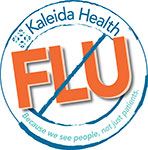
Below are the November Medical Staff Updates. As a reminder, all providers must complete the attestation at the bottom of this page by November 30.
Medical Leadership Message

As 2016 draws to a close, we review our successes and evaluate our challenges for 2017. System wide, we had difficulty with our consultation services for pain management. We have been able to resolve this with the addition of the University at Buffalo Neurosurgery pain management service. Consults in pain management may now be obtained at all of our adult sites.
We’ve just come off a strong DNV survey. The medical staff will be working closely with nursing leadership as we redefine our restraint policies and the work flow process in order to ensure compliance with the strict regulations. We appreciate your assistance with this very important matter.
The Press Ganey Physician Engagement Survey closed with an excellent participation rate from Kaleida Health’s medical staff. As we await the results of the survey, we want to thank you for your participation. The information that is gathered from the survey helps us tremendously in bolstering our relationships with the medical staff and meeting your needs.
One of the challenges going forward for 2017 is the recurring challenge of patient satisfaction scores. In 2017, we will be launching a very robust program, working with the medical directors at each site in an effort to improve our scores. Physician leadership in this area is critical in order to have our scores reflect the quality of care that is delivered at Kaleida Health. We look forward to working with everyone on this.
David Hughes, MD, MPH
Chief Medical Officer
Kaleida Health
Kenneth Snyder, MD, PhD
Vice President, Physician Quality
Kaleida Health
Colin McMahon, MD
Chief Medical Officer
Buffalo General Medical Center
David Pierce, MD, FACEP
Chief Medical Officer
Millard Fillmore Suburban Hospital and DeGraff Memorial Hospital
Stephen Turkovich, MD
Chief Medical Officer
Women & Children’s Hospital of Buffalo
Kamil Alpsan, MD
Site Medical Director
DeGraff Memorial Hospital
Message from the President of the Medical/Dental Staff
 I was privileged to attend the Kaleida Health Board retreat last month. The Board invited several speakers from the Greater New York Hospital Association (GNYHA).
I was privileged to attend the Kaleida Health Board retreat last month. The Board invited several speakers from the Greater New York Hospital Association (GNYHA).
One of the major topics GNYHA covered was payment reform. As most of you know, there is a major transition of how healthcare services will be reimbursed, from our current largely fee-for-service model to a pay-for-outcomes system (value-based payment). Value-based payment (VBP) is designed to reduce the quantity of services delivered. VBP will require that physicians and hospitals contract together for all services (inpatient and outpatient) around a condition/procedure, and will require that they assume financial risk for those services. This will change the way we practice.
In addition to VBP, some of the key financial challenges and trends for physicians and hospitals highlighted by GNYHA were:
- Shift of volume from higher-margin inpatient to lower-margin outpatient services
- Shift from higher-margin employer-sponsored commercial insurance to low-margin government (Medicaid and Medicare) insurance and other plans
- Shift to high-deductible plans within employer-sponsored insurance with resulting challenges to collections
- Commercial payer consolidation to provide leverage to reduce payments
- Increasing size (vertical and horizontal integration, aka “integrated delivery system”) of health systems to achieve scale needed to assume risk under value-based payment
- Increasing hospital/physician alignment to enable VBP contracts with payers
- Infrastructure (esp. EHR/IT) required for VBP
These trends will require the Kaleida Health Medical/Dental Staff and administration to work closer together to ensure success for both providers and hospitals while delivering the highest quality care to our patients.
Peter Winkelstein, MD, MS, MBA, FAAP
Medical/Dental Staff President
Kaleida Health
Thank You
 Thank you to the invited physicians and residents who completed the 2016 Press Ganey Engagement Survey. Physicians achieved a 56% response rate, which is two points higher than 2015 and the highest response rate ever for physicians.
Thank you to the invited physicians and residents who completed the 2016 Press Ganey Engagement Survey. Physicians achieved a 56% response rate, which is two points higher than 2015 and the highest response rate ever for physicians.
What an outstanding achievement in engagement. We cannot thank you enough for taking the time to complete the survey. Your input will allow us to continue to move forward and provide a roadmap to improve our physician engagement.
The survey results will be shared in late fall, followed by action planning for increased physician engagement in 2017.
Thank you for all you do.
David Hughes, MD, MPH
Executive Vice President and Chief Medical Officer
Kaleida Health
Clinical Research: COPD
Chronic obstructive pulmonary disease (COPD) is a very common medical condition, affecting as many as one in 10 adults.
COPD is an umbrella term that encompasses emphysema and chronic bronchitis. It is caused by exposure of the lungs to noxious particles or gases — most commonly tobacco smoke. COPD manifests as shortness of breath, cough and phlegm production, and limited exercise tolerance that is present on a daily basis for months or years. It usually gets progressively worse over time.
Diagnosis is simple, as all it requires is a careful assessment by a healthcare practitioner and a lung function test known as spirometry. However, only about half of COPD patients have been properly diagnosed. Cessation of exposures to tobacco smoke is essential to prevent progression of the disease. The mainstays of COPD treatment are existing medications that open up the airways (bronchodilators) and reduce lung inflammation, and are usually delivered by inhalation. These medications can reduce symptoms and prevent intermittent flare-ups (exacerbations).
However, there are several unmet medical needs in COPD treatment. These include medications to reduce inflammation and infection in the lungs, to improve lung function, to restore damaged lungs, and to prevent smoke-related lung damage. There is much research underway to find such treatments. University at Buffalo has been at the forefront of COPD research and there are several studies being conducted currently. Please contact Yvonne Woolwine-Cunningham at 888-4712 or by email at yvonnewo@buffalo.edu if you would like more information.Influenza Vaccination Status of Healthcare Personnel
It is time to prepare for the 2016-2017 influenza season. Kaleida Health will continue to follow the New York State Department of Health mandate titled, “Regulation and Prevention of Influenza Transmission by Healthcare and Residential Facility and Agency Personnel” to document the vaccination status of healthcare personnel.
As outlined in the mandate, the vaccination status of all healthcare personnel must be documented, and all unvaccinated personnel must wear a surgical mask at all times while in areas where patients or residents are typically present during the entire influenza season as determined by the New York State Commissioner of Health. Masks will be available at all main entrances of Kaleida Health’s hospitals throughout influenza season.
Obtaining Your Influenza Vaccine
Flu clinics will be held throughout the fall by both Kaleida Health’s Employee Health Department and the Visiting Nursing Association of Western New York (VNA). Vaccines will also be available at each site’s Employee Health office during scheduled hours for those unable to attend a clinic. The clinic schedule is available on Employee Health’s website on KaleidaScope.
Providers must have their Kaleida Health ID badge to receive the vaccine from Employee Health. Providers will need both their Kaleida Health ID badge and health insurance card if utilizing a VNA- sponsored clinic.
 ID Badge Sticker Requirement
ID Badge Sticker Requirement
At the time of vaccination, a Kaleida Health Employee Health nurse or VNA administering nurse will apply a flu sticker on the right lower corner of the Kaleida Health ID badge to provide visual verification of vaccination.
Providers vaccinated by a facility or provider other than Kaleida Health or the VNA will need to bring official proof of vaccination to Kaleida Health’s Employee Health Department in order to receive their sticker of verification.
Those who decline the influenza vaccine must complete a “Declination of Influenza Vaccine” form. Anyone who declines the vaccine due to a medical condition will also need to complete the “DOH Medical Exemption Statement” form. Details for both forms are available on Employee Health’s website on KaleidaScope.
Employee Health, or a site designee, will apply a red sticker on the right lower corner of the Kaleida Health ID badge of those who decline vaccination.
Once influenza season is officially declared, all providers must have either a flu sticker or a red sticker on their ID badge when in a Kaleida Health facility. Those with a red sticker must also wear a mask in areas where patients or residents are typically present.
Submitting Proof of Vaccination to the Medical Staff Office
This year, Kaleida Health’s Medical Staff Office will be tracking providers’ vaccination status. All providers must submit a copy of their proof of vaccination or declination of vaccination to the Medical Staff Office. Please scan and email documentation to Rosie Light at RLight@KaleidaHealth.org or fax to 859-5592.
Infection Orderset Talent Management Training for All Admitting Providers
Kaleida Health’s Antibiotic Stewardship policy (TX.IVs & MEDS.22) went into effect in June 2015. A core element of stewardship was the development of infection-specific ordersets in the Electronic Medical Record (EMR) to guide treatment of the most commonly seen infections (i.e. pneumonia and C-Diff).
To help introduce and reinforce the use of these ordersets, a PowerPoint presentation has been placed on Talent Management and will be assigned to all admitting providers on Monday, November 7, 2016. The due date for review of this presentation will be Monday, January 2, 2017.Methicillin-Resistant Staphylococcus Aureus (MRSA): How to Prevent the Spread of Infection
Methicillin-Resistant Staphylococcus Aureus (MRSA) has emerged as one of the most predominant pathogens in healthcare-associated infections. Treatment options for MRSA are limited and less effective than options available for susceptible S. aureus infections and result in higher morbidity and mortality. Its high prevalence influences unfavorable antibiotic prescribing, which contributes to further spread of resistance. Because MRSA colonization generally precedes infection with this organism, MRSA interventions primarily have targeted two broad areas: 1) preventing transmission from colonized to uncolonized persons, and 2) preventing infection in colonized individuals. The best way to prevent such transmission is a strong focus on the basics: good hand hygiene practices and timely and appropriate isolation/use of personal protective equipment (PPE such as gloves, gowns, etc. ).
As part of Standard Precautions, all those working in patient care areas must adhere to the World Health Organization’s 5 Moments of Hand Hygiene:
- Before touching a patient
- Before clean/aseptic procedures
- After body fluid exposure/risk
- After touching a patient
- After touching patient surroundings
In addition, hand hygiene should be performed upon entering and exiting patient rooms. MRSA-positive patients, whether colonized or infected, should be immediately placed on Contact/Critical Care Contact Precautions, and strict adherence to these precautions is expected of all staff members. Visitors should also be educated and encouraged to abide by the same expectation.
Dedicated items such as blood pressure cuffs and stethoscopes should also be used whenever possible with patients on Contact/Critical Care Contact Precautions. Any reusable medical equipment coming into contact with the patient/patient surroundings should be disinfected before and after each patient use.
As there is variation in the literature on how long MRSA survives on surfaces found in the hospital setting ranging from days to months, with higher survival rates on polyesters and polyethylene (i.e. , scrub attire and plastics), it is important to pay particular attention to appropriate disinfectant procedures.
These key practices are of vital importance to prevent MRSA infection and spread and, in turn, to keep our patients safe.New York State’s Heroin and Opioid Crisis
In June of 2016, the New York State Legislature, in cooperation with Governor Cuomo, passed a comprehensive package of bills designed to combat the state’s heroin and opioid crisis. These bills will affect operations and the way many physicians practice at Kaleida Health. The following are major changes that will affect the Medical Staff:
- A prescription for the initial treatment of acute pain with a schedule II, III or IV opioid can only be written for seven days. This limit does not apply to chronic pain, pain treated as part of cancer care, hospice, end-of-life care or palliative care. Upon a subsequent consultation, the practitioner can refill or write a new prescription for up to 30 days.
- All providers with a DEA registration number, on or after July 1, 2017, must complete a three-hour course in addiction, pain management, and palliative care every three years, the first within one year of registration. Providers will be able to show that this requirement was met by an attestation that will be provided when they renew their registration.
In addition to these changes, Kaleida Health will have to create and modify policies and procedures for all individuals who engage in direct patient care. These policies will address the identification, assessment and referral of individuals who are at risk of having, or already have, a substance abuse disorder. Kaleida Health will also work toward developing training programs for the staff around these issues. Feedback and involvement of our physicians will be critical in the development of policies, procedures and the training programs.
Medical Staff Attestation - November 2016
By submitting this attestation, I confirm that as a member of the medical staff I have read and understand the information included in this email from Kaleida Health in accordance with Kaleida Health policy MED.41 as approved by the Medical Executive Committee.
| Fields marked with an asterisk (*) are required. |
|
|